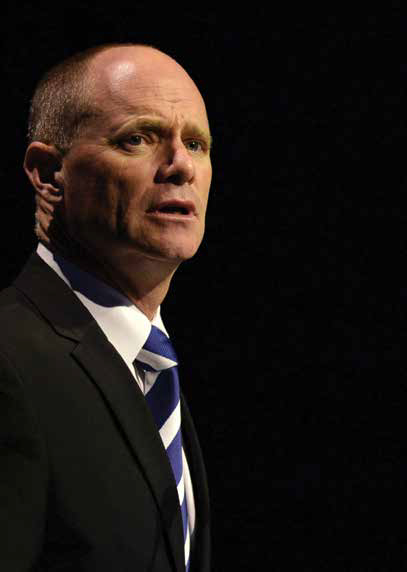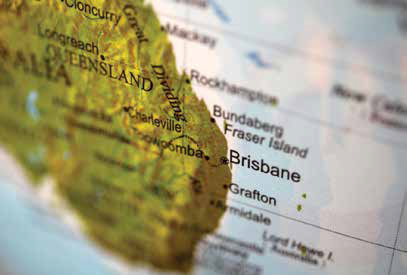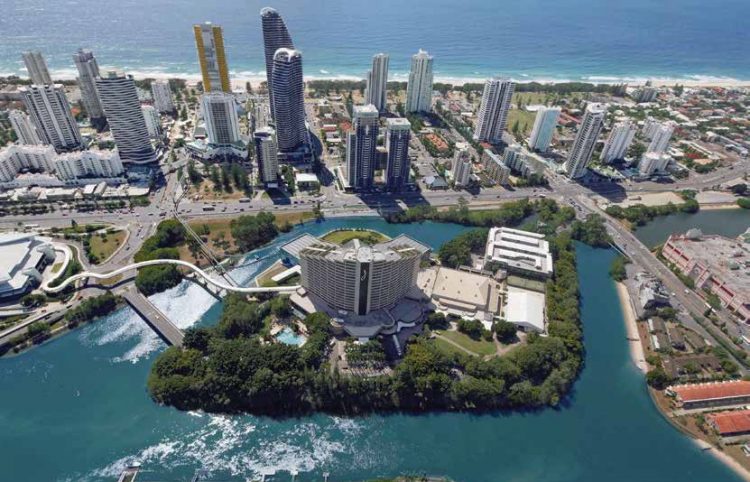The Australian state plans to join Asia’s casino boom and fix its ailing economy with destination-scale casinos: A calculated risk or pure wishful thinking?
Queensland has Australia’s largest number of casinos, but revenue is flagging. The heavily indebted state government thinks the solution to its gaming funk and sluggish economy and revenues amid falling mineral export prices is to issue three new casino licenses to construct three “world-class” integrated resorts. The projects, with proposed investment exceeding A$17 billion (US$16 billion), would create badly needed jobs, more than 5,000 in construction and 30,000 permanent positions.
Queensland Premier Campbell Newman is driving the expansion strategy as his Liberal National Party government, swept into power in an unprecedented landslide in 2012, prepares to face voters by next June. The government has projected a A$2.2 billion deficit for the fiscal year that began 1st July, pushing state debt close to $80 billion. A spokesman for the government’s Department of State Development, Infrastructure and Planning calls the integrated resort initiative “a once in a generation opportunity”. The IRs are intended to complement Queensland’s natural attractions, ranging from the Great Barrier Reef to rugged Outback landscapes to aboriginal culture to wineries dotting rolling hills across 1.9 million square kilometers. But the state may be overplaying its hand.
In May the government granted provisional gaming licenses to Hong Kong billionaire Tony Fung’s $8.15 billion Aquis IR near Cairns and Chinese investment company ASF Group’s $4.5 billion Broadwater IR in Gold Coast. For the capital of Brisbane the state shortlisted four groups, now merged to two, including incumbent Echo Entertainment and James Packer’s Crown Resorts, each now with Chinese partners. The government and applicants are being tight-lipped about details of the projects under consideration.
Proponents see the IRs as a play on the double-digit growth of Chinese visitors to Queensland and Australia overall. China has become Australia’s second-biggest source of visitors, behind New Zealand, with 715,300 arrivals last year, up 14.2% from 2012. Australia captured less than 4% of the estimated A$129 billion mainland tourists spent on overseas trips and many believe it can do better. “Australia is still perceived as someplace aspirational and exotic by Chinese tourists,” GamePlan Consulting founder Sudhir Kale, an expert in international casino marketing, says.
Queensland attracted 297,000 Chinese visitors last year, including 259,000 holiday-makers, usually higher spenders, and garnered $604 million of Australia’s $3.55 billion in Chinese visitor expenditures. A Queensland tourism report projects that total expenditure by overnight visitors in the state will grow from $21.5 billion in 2012 to $30 billion in 2020. Nationally, Chinese visitors are expected to account for one-third of expenditure growth. For Queensland that math indicates $2.85 billion in additional Chinese visitor spending.
Yet, there are some knowledgeable Australian gaming hands who doubt the proposed IRs will get beyond the drawing board outside Brisbane, where the casino license is intended to anchor the redevelopment of the central business district.
“I just don’t see the numbers working,” Newpage Consulting principal David Green, a former Australian gaming regulator, says. “There just is not critical mass to support large-scale investment.”
“One has to be careful not to be blinded by the IR mirage so they don’t end up like the Ho Tram property in Vietnam,” says Ovion Partners Managing Director Peter Klugsberger, a Sydney based consultant who worked as an executive at Marina Bay Sands in Singapore. “They also believed the ‘Build it and they will come’ slogan, and so far nobody came.”
The government, however, is confident IRs can work the same magic they’ve worked in Singapore.
“The IR in Singapore is viewed globally as an exemplar development,” the Department of State Development says. “IR development within Queensland will complement the state’s natural attractions within the globally competitive tourism market.”
But Mr Klugsberger says, “For a casino operator to be successful in applying the Singapore lessons it needs to have: a) a strong casino brand; and b) a global network of operations that allow them to shuffle players around—losing VIP players love to change venues after a bad loss. One company that does this extremely well is Crown.”
Mr Green, who advised the Singapore government on gaming regulation, also wonders about the comparisons. “Queensland will not be another Singapore,” he says. “In terms of international visitors, I believe there are less than 3 million per annum going to Queensland. [For the year ended in March, Queensland totaled just over 2 million overseas visitors; domestic holiday-makers in the state exceeded 7.5 million.] Most tourism is domestic, and every Australian state and territory has at least one casino and, with the exception of Western Australia, large numbers of community-distributed EGMs.”
Queensland has 44,753 EGMs in 1,270 locations at latest count, many of them clubs run by community organizations such as veterans groups. Mr Green says the clubs put casinos at “at a serious distributional disadvantage.”
For IRs to succeed, Mr Green believes “That will require either an awful lot of imports or a much higher spend per patron, together with a reorientation to tables.”
Queensland had an estimated $2 billion in gaming machine revenue last year across all venues but less than $300 million in casino table revenue.
“To make such an investment work an operator needs to bring in: a) mountain loads of Chinese mass-market players; or b) high-end junkets,” Mr Klugsberger says. “What I am asking myself is: What is Brisbane’s and Gold Coast’s unique selling point? I would argue that nobody is quite sure.”

ORGANIC GROWTH
Mr Kale, a marketing professor at Gold Coast’s Bond University, carried out a study of southern Queensland for the government in advance of the IR offerings. The study projects sufficient organic demand in coming years for one additional casino on the scale of Crown Melbourne—500 tables and 2,500 machines—or two smaller ones. In the base-case scenario, without the introduction of IRs, the study forecast the casino gaming market will increase from last year’s estimated $530 million (the market was about $620 million at the time of the study in 2012) to $1.2 billion in 2016. This includes $120 million of international commission business, i.e. overseas VIPs, representing 17.5% of total GGR. In 2013, revenue from that segment was around $14 million, 2.5% of total GGR, and declined by 60% in the second half of the year. VIP win rates fell sharply, but turnover also dropped, by 30%, despite double-digit growth in Chinese visitor numbers.
For IR proponents, those numbers underline the need for game-changing properties to match options in the region, especially Macau and Singapore. “The introduction of integrated resort development casinos into Queensland will provide a new unique tourism and entertainment based product … a product that better positions Queensland to compete globally for the competitive international tourism market,” the Department of State Development says.
“I think Chinese VIP customers will go to all the nice casinos and popular tourism destinations in Australia, such as the resorts in Cairns, Gold Coast and Brisbane,” Macau junket promoter, investor and consultant Tony Tong of Pacific Financial Services says.
The government says Queensland casinos currently work with junket promoters. Gaming tax is 10% on junket play, compared with 20% on main-floor play including fully automated table games, and 30% on gaming machines. Junket promoters and representatives are subject to suitability checks by Queensland’s regulator, the Office of Liquor and Gaming Regulation. Mr Klugsberger warns that Queensland regulators can be “very tough,” but Mr Green believes the bigger issue for junkets will be credit.

The government also must approve commission and/or revenue share arrangements between casinos and the junkets. There are maximum commission rates for different games, from 1.112% for blackjack to 2.403% for roulette. For baccarat, the maximum commission is 2.25%. The tax and commission rates mean Queensland can offer compelling incentives to Macau junkets (the commission that can be offered to junkets on baccarat is capped at 1.25% in Macau).
“Macau is definitely the most important stepping stone for casinos and junkets to legally market their services and products for foreign gaming destinations,” Mr Tong says. “Macau is also a key hub for payment and settlement as most VIP players and junket agents have accounts in various casinos and VIP clubs for easy payment settlement and commission arrangements.”
The issue, according to one Queensland gaming executive who spoke on condition of anonymity, is “How do they convince a high roller to get on a plane in China or elsewhere in Asia and fly between six and 10 hours to Brisbane or Cairns when they have so many options evolving in Macau, Vietnam, Cambodia, Manila, Singapore that are closer and offer everything the Australian casinos do. The only way may be to buy the business, which puts pressure on the operating costs and the overall business model, which in turn means the local market is even more important.”
Indeed. Government think tank CSRIO’s report on the future of Queensland tourism concludes that while Asian visitors will provide a big lift, domestic visitors will remain its “foundation” for the next 20 years. Mr Kale’s market study expects the domestic market to provide 70% of gaming revenue.

“Sure, Queensland has its attractions, but it will still rely, in my view, on domestic business,” Mr Green says. “Queensland is like Florida, it has a disproportionate number of retirees in its population, as well as itinerants—gray nomads, i.e. baby boomers with mobile homes, fruit pickers and casual tourist operatives. I am far from sold on the story.”
The most revealing insight into Queensland’s IR potential may come from international gaming operators. The opportunity to build integrated resorts in Singapore lured major casino companies from all over the world and the possibility of IRs in Japan is attracting even more of them. In Queensland, none of them expressed interest. The only experienced operators in the running are locals Crown and Echo, while the groups that have made the biggest promises have never run a casino.

“The absence of established industry names does not surprise me,” Mr Green says. “Asia offers bigger bang for the buck marketwise, a more liberal industrial-relations environment and cheaper access to players—you don’t need to fly them 5,000 kilometers to play.”
Editor at large Muhammad Cohen also blogs for Forbes on gaming throughout Asia and wrote Hong Kong On Air, a novel set during the 1997 handover about TV news, love, betrayal, high finance and cheap lingerie.




























